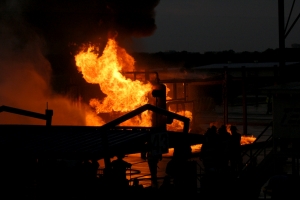Most workers don’t realize what kind of risk they are in at their workplace when it comes to combustible dust explosions because so often such dangers go undetected. Our Massachusetts workers’ compensation attorneys want to remind employers and employees what a dangerous hazard combustible dust is if it ignites and causes an explosion on the job.
Many industries are affected by combustible dust; explosions may result in serious or fatal work injuries in Boston and elsewhere in the state.

According to the United States Department of Labor Occupational Safety & Health Administration, if dust is suspended in air at just the right absorption, it can become explosive in nature. When finely divided in form, combustible materials can burn quickly. Most explosions are extremely dangerous because of the force they bring, causing injury or even fatality to employers or employees on the job.
If the building crumbles in an explosion it can cause entrapment, which can lead to lasting effects if the victim becomes burned or inhales too much smoke from the fire.
There are a number of industries at risk of combustible dust hazards. Some industries at risk include: metal processing (zinc, magnesium, iron and aluminum), recycling operations, rubber, furniture, agriculture, chemicals, food (candy, sugar, spice and flour), pharmaceuticals, tire and rubber manufacturers, tobacco, plastics, and wood.
Employers have a responsibility to be proactive in detecting combustible dust before it becomes explosive. OSHA recommends a thorough hazard assessment of all spaces, potential ignition sources, materials handled, and operations taking place.
In order to control dust and ignition, OSHA recommends the following:
-A program should be implemented that inspects, tests, and controls hazardous dust.
-Appropriate systems and filters should be used at all times.
-Keep dust from escaping equipment and ventilation systems.
-Surfaces that have minimal dust accumulation should be used and maintained.
-Periodic inspections for dust residues in open and hidden areas should be performed.
– Approved dust collection vacuums should be used at all times.
-Minimize static electricity, mechanical sparks and friction, smoking, open flames, and sparks as much as possible from the workplace.
-If foreign materials that have the ability to ignite combustibles are detected, use a separator device to keep them from firing.
-Dust should be separated from heating systems and heated surfaces.
-A program should be followed for equipment preventive maintenance.
Industries need to be proactive in reducing the risk of a combustible dust explosion. Taking preventative measures can keep workers safe and free from preventable risk in the workplace.
The workers’ compensation lawyers at Jeffrey S. Glassman are dedicated to fighting for the rights of victims injured on the job. If you have suffered personal injury at work or have a question about a workers’ compensation claim in Boston or the surrounding areas, call for a free and confidential appointment. Call (617) 777-7777 today.
 Boston Personal Injury Attorney Blog
Boston Personal Injury Attorney Blog

